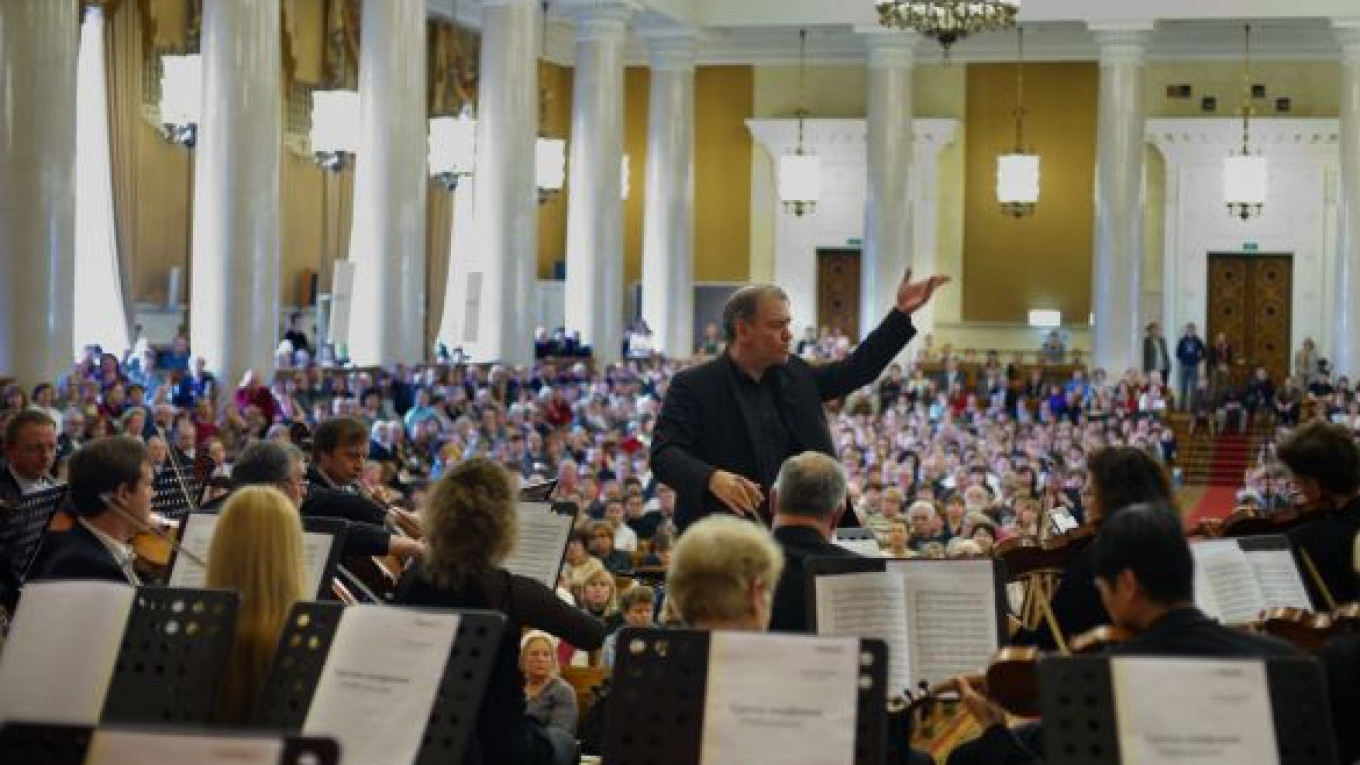For the 10th year in a row, Easter celebrations on Sunday are set to include the opening of the Moscow Easter Festival, with bell ringing in the mid-afternoon at the Christ the Savior Cathedral and an evening concert at Tchaikovsky Hall by the orchestra of St. Petersburg’s Mariinsky Theater under the baton of festival artistic director Valery Gergiev.
Though lacking the devoted patronage of former Mayor Yury Luzhkov, who together with Gergiev created the festival in 2002, this year’s festival program seems at least as ambitious and wide-ranging as any in the past. In addition to a full schedule of events in Moscow each day between Sunday’s opening and the traditional conclusion on Victory Day, May 9, the festival extends to no less than 36 other Russian cities and five beyond the country’s borders in Belarus, Kazakhstan, Lithuania and Ukraine.
Central to the Easter Festival is its so-called symphonic program, which includes solo recitals as well as full-scale orchestral concerts. Sunday’s opening program features the music of Sergei Prokofiev, a composer with whom Maestro Gergiev seems particularly in tune. Denis Matsuyev performs as soloist in Prokofiev’s Piano Concerto No. 3, and Russia’s most acclaimed mezzo-soprano, Olga Borodina, makes a rare Moscow appearance in the cantata put together by Prokofiev from his score for Sergei Eisenstein’s classic film “Alexander Nevsky.”
Opera follows on Monday, with a concert performance at Tchaikovsky Hall of Gaetano Donizetti’s “Lucia di Lammermoor,” with Gergiev and the orchestra, chorus and soloists of the Mariinsky joined, in the title role, by world-renowned French soprano Natalie Dessay.
Having paid their respects to Moscow, Gergiev and the Mariinsky orchestra then embark on their usual marathon of Easter Festival concerts in the Russian regions and abroad, visiting Orenburg, Chelyabinsk, Yekaterinburg, Omsk and Kazakhstan’s present and former capitals, Astana and Almaty.
Returning briefly to Moscow on May 4, Gergiev and the orchestra play their traditional afternoon concert at Moscow State University, followed by an evening performance at Tchaikovsky Hall, together with Mariinsky soloists and chorus, of Giuseppe Verdi’s Requiem, dedicated to the victims of Japan’s recent earthquake.
Taking to the road again on May 5, the orchestra and conductor are scheduled on successive days to visit Voronezh and again travel abroad, to Kiev, Vilnius and Minsk, returning to Moscow on May 9 for yet another festival tradition, its open-air afternoon concert in Victory Park, and to close the festival with an evening concert, its program still undisclosed, at the Moscow International House of Music, or Dom Muzyki.
All in all, Gergiev and the Mariinsky Orchestra — or, in two cases, sections of the orchestra — are scheduled to play no less than 19 concerts in the space of 16 days, a feat unlikely to be undertaken by any other conductor and orchestra in the world. Similar feats at past Easter Festivals have all too often resulted in performances that reflect exhaustion and a lack of adequate rehearsal. Nevertheless, Gergiev seems to thrive on such hugely demanding schedules. As a friend once put it, “he would probably be happiest if he could conduct 24 hours a day, seven days a week.”
A very special feature of this year’s Easter Festival symphonic program is the appearance in solo recitals at Tchaikovsky Hall by laureates of the prestigious International Fryderyk Chopin Piano Competition that took place in Warsaw last October. Russian third-prize winner Daniil Trifonov appears on May 1, followed by Bulgarian fourth-prize winner Evgeni Bozhanov on May 2 and Russian first-prize winner Yulianna Avdeyeva on May 3.
The Moscow program of the Easter Festival also offers a wealth of choral music, much of it sung in the city’s churches. As usual, the choral program includes not only choirs from Moscow and other parts of Russia, but also choral ensembles from abroad, in this year’s case from Abkhazia, Belarus, the Greek island of Crete, Hungary, Lithuania and Serbia.
The choral program opens on Monday afternoon at the Meeting Hall of the Christ the Savior Cathedral with Kazan’s Chamber Choir of the Republic of Tatarstan joining soloists, chorus and orchestra of the Mariinsky, all under Gergiev’s direction, in a performance of Sergei Rachmaninov’s “The Bells,” the composer’s imaginative setting of a poem of the same title by Edgar Allan Poe.
Featured as always on the choral program is the gala concert at Tchaikovsky Hall, which takes place on May 7 and brings together choirs from Moscow and St. Petersburg and this year’s guest ensembles from Crete, Hungary and Serbia.
Other features of the Easter Festival are the daily afternoon sessions of bell ringing from the towers of churches throughout the city and a series of charitable concerts at Moscow children’s and veterans’ homes.
For the full schedule of the Moscow Easter Festival events, see www.easterfestival.ru.
A Message from The Moscow Times:
Dear readers,
We are facing unprecedented challenges. Russia's Prosecutor General's Office has designated The Moscow Times as an "undesirable" organization, criminalizing our work and putting our staff at risk of prosecution. This follows our earlier unjust labeling as a "foreign agent."
These actions are direct attempts to silence independent journalism in Russia. The authorities claim our work "discredits the decisions of the Russian leadership." We see things differently: we strive to provide accurate, unbiased reporting on Russia.
We, the journalists of The Moscow Times, refuse to be silenced. But to continue our work, we need your help.
Your support, no matter how small, makes a world of difference. If you can, please support us monthly starting from just $2. It's quick to set up, and every contribution makes a significant impact.
By supporting The Moscow Times, you're defending open, independent journalism in the face of repression. Thank you for standing with us.
Remind me later.






